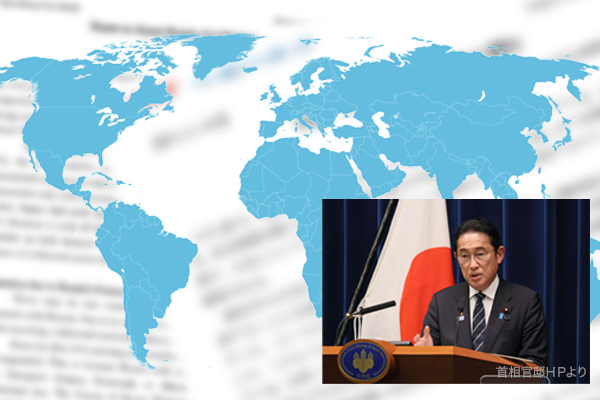Japan is now plagued with serious domestic troubles and external threats. The current crisis Japan faces is even deeper than the crisis during Meiji Restoration period when lean low-ranking samurai warriors risked their lives to protect Japan.
China, Russia, North Korea, and Iran are stepping up cooperation
China, Russia, North Korea and Iran are openly stepping up their cooperation. China supports Russia by purchasing Russian oil and gas. Chinese-made “civilian” drones fly over Ukraine. On October 18, Russian President Vladimir Putin declared Taiwan as an inalienable part of China for the first time, indicating his intent to strengthen cooperation with China even by being obedient to Beijing. North Korean leader Kim Jong Un called the war of aggression against Ukraine “Russia’s just war,” demonstrating his absolute support for Putin. The two leaders have established a mutual assistance regime with Kim offering ammunition, and Putin offering military technologies respectively. North Korea, which possesses tactical nuclear missiles putting Japan within their striking range, will take advantage of Russian technologies to further improve accuracy of its intercontinental ballistic missiles capable of reaching the U.S. mainland.
Iran had reached a stage where it could acquire highly enriched uranium necessary for the production of nuclear weapons in 12 days, the International Atomic Energy Agency said last March.
Chinese President Xi Jinping at talks with U.S. President Joe Biden in November said that “Planet Earth is big enough” to accommodate two superpowers, indicating Chinese ambition has expanded from the dominance of the Western Pacific to that of the entire planet. Its offensive against the international community has entered a new dimension through three important legislations: the Anti-Foreign Sanctions Law promulgated in June 2021, and the revised Anti-Espionage Law and the Foreign Relations Law enforced in July 2023. As a result, arrangements have been established for the extraterritorial application of China’s domestic laws. China is now ready to respond to foreign countries, organizations, and individuals with the application of domestic laws on almost all issues to protect its national sovereignty, security, and development interests. The foundation of a great Chinese empire in the 21st century is indifferent to a nuclear-free world advocated by Japanese Prime Minister Fumio Kishida or a world that emphasizes human dignity.
Prime Minister Kishida’s big role
The confrontation between the values of Japan, the United States and Europe and those of China, Russia, North Korea and Iran will be prolonged. It is time for Japan to play a role in helping the Western bloc maintain its supremacy and win in the confrontation. Can Japan work with the U.S. to make arrangements to confront the biggest threat from China? This is a struggle that affects the rise and fall of not only Japan but also the entire Western world. Just as the North Atlantic Treaty Organization does in Europe, Japan must take responsibility for burden-sharing in the Indo-Pacific, where its national survival is at stake.
We must not spare any effort to realize the “Free and Open Indo-Pacific” advocated by former Prime Minister Shinzo Abe. The Quad, a Japan-U.S.-Australia-India framework that spans the Indo-Pacific, and the Comprehensive and Progressive Agreement for Trans-Pacific Partnership represents strategies originating from Japan. For the Kishida administration, though things go from bad to worse with a political fundraising scandal within the ruling party, these Japan-led strategies hold the key to make a breakthrough. Kishida should exercise the spirit of the three national security documents that he went over line by line and approved. He should also remember that the fundamental determination to defend Japan by its own efforts lies in constitutional amendment. The positive reaction that Japan will provoke in the U.S. and Europe by doing so should become his political energy.
Yoshiko Sakurai is President, Japan Institute for National Fundamentals.


